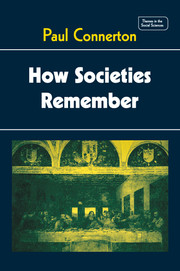Summary
We generally think of memory as an individual faculty. None the less, there are a number of thinkers who concur in believing that there is some such thing as a collective or social memory. I share that assumption, but tend to diverge over the question as to where this phenomenon, social memory, can be found to be most crucially operative.
Accordingly, the question to which this book is addressed is: how is the memory of groups conveyed and sustained? The term group is here being used in a generously capacious sense and with some flexibility of meaning, to include both small face-to-face societies (such as villages and clubs) and territorially extensive societies most of whose members cannot know each other personally (such as nation-states and world religions).
Readers might reasonably expect that the question thus posed – how is the memory of groups conveyed and sustained? – might lead to a consideration, either of social memory as a dimension of political power, or of the unconscious elements in social memory, or both. In what follows these issues are occasionally touched upon, but they are intentionally not addressed in an explicit and systematic way. The value of addressing such issues, I take it, can hardly be doubted. For it is surely the case that control of a society's memory largely conditions the hierarchy of power; so that, for example, the storage of present-day information technologies, and hence the organisation of collective memory through the use of dataprocessing machines, is not merely a technical matter but one directly bearing on legitimation, the question of the control and ownership of information being a crucial political issue.
Information
- Type
- Chapter
- Information
- How Societies Remember , pp. 1 - 5Publisher: Cambridge University PressPrint publication year: 1989
Accessibility standard: Unknown
Why this information is here
This section outlines the accessibility features of this content - including support for screen readers, full keyboard navigation and high-contrast display options. This may not be relevant for you.Accessibility Information
- 2
- Cited by
